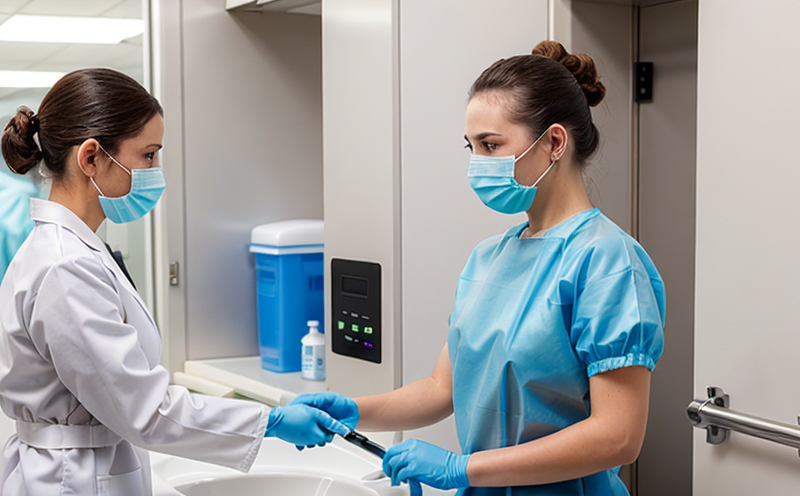Bacterial reduction testing of surgical gowns
The integrity and performance of surgical gowns are critical to patient safety and effective infection control. Bacterial reduction testing is a vital component in ensuring that these garments meet the highest standards of hygiene and sterility. This service aims to validate that surgical gowns can effectively reduce bacterial contamination, thereby minimizing the risk of cross-infection during surgical procedures.
Bacterial reduction testing typically involves exposing the surgical gown to controlled environmental conditions that simulate real-world use scenarios, such as handling in a sterile environment or contact with contaminated surfaces. The test then assesses the extent to which bacteria are reduced after the gown has been subjected to these conditions. This is crucial for ensuring that healthcare professionals can wear garments that provide maximum protection against pathogens.
The testing process begins by selecting appropriate bacterial strains, such as Staphylococcus aureus or E. coli, which are commonly used in hygiene and sterility assessments. These bacteria are then inoculated onto the surgical gown according to specified ISO standards (ISO 16232:2009). After exposure, the garments undergo a series of cleaning procedures that mimic typical use conditions, including washing or autoclaving.
The effectiveness of bacterial reduction is measured by comparing the initial and final counts of bacteria on the gown. This can be done using quantitative methods like colony-forming unit (CFU) counting or qualitative methods such as PCR-based detection techniques. The results provide a clear indication of how well the surgical gown performs in reducing microbial contamination.
Understanding the critical role that bacterial reduction plays in patient safety, Eurolab employs advanced microbiological testing protocols to ensure accurate and reliable results. Our state-of-the-art facilities are equipped with sophisticated instrumentation capable of detecting even trace amounts of bacteria, ensuring that no potential sources of infection go undetected.
The significance of this service extends beyond mere compliance; it reflects a commitment to excellence in healthcare practices. By rigorously testing surgical gowns for their ability to reduce bacterial contamination, we contribute significantly to maintaining high standards of hygiene and sterility within the medical community.
Our comprehensive approach ensures that every aspect of the testing process is meticulously controlled and documented, providing clients with robust evidence of their product's performance. This level of detail is essential for meeting stringent regulatory requirements and gaining trust from healthcare providers worldwide.
In summary, bacterial reduction testing is an indispensable tool in safeguarding patient health by validating the efficacy of surgical gowns in preventing cross-infection. Through rigorous testing procedures and advanced methodologies, Eurolab offers unparalleled assurance that our clients' products meet or exceed industry standards.
Benefits
- Enhanced Patient Safety: Reduced risk of postoperative infections through proven bacterial reduction capabilities.
- Regulatory Compliance: Adherence to international hygiene and sterility standards like ISO 16232:2009.
- Improved Product Reliability: Verification that surgical gowns consistently meet specified performance criteria under various conditions.
- Increased Market Confidence: Demonstrating commitment to quality control, which enhances brand reputation and customer trust.
The benefits of bacterial reduction testing extend far beyond individual product validation. It fosters an environment where continuous improvement in hygiene practices can be achieved across the entire healthcare sector.
Eurolab Advantages
- Accredited Expertise: Our team of microbiologists and engineers are trained to conduct tests that meet international standards (ISO, ASTM).
- Advanced Facilities: State-of-the-art laboratories equipped with cutting-edge technology for precise bacterial detection.
- Dedicated Client Support: We provide customized solutions tailored to specific client needs and market requirements.
- Comprehensive Reporting: Detailed reports that offer comprehensive insights into test outcomes, supporting informed decision-making processes.
By leveraging these advantages, Eurolab ensures that our clients receive the most accurate and reliable results possible. Our commitment to excellence is reflected in every aspect of our service delivery.
Environmental and Sustainability Contributions
- Reduced Waste: By ensuring surgical gowns are effective at reducing bacterial contamination, there's less need for frequent replacement, leading to lower waste generation.
- Eco-Friendly Materials: We promote the use of sustainable materials that minimize environmental impact throughout their lifecycle.
- Energy Efficiency: Our testing methods and protocols are designed to optimize energy consumption without compromising quality standards.
The focus on sustainability at Eurolab aligns with global efforts towards greener practices in healthcare. By integrating eco-friendly approaches into our services, we contribute positively to environmental conservation while maintaining the highest levels of product performance.





